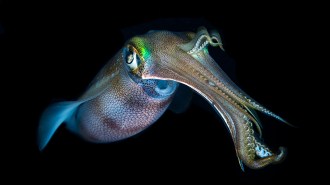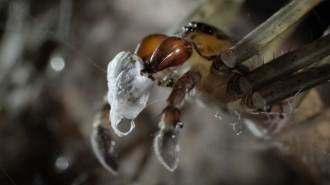Uncategorized
-
 Artificial Intelligence
Artificial IntelligenceGenerative AI is an energy hog. Is the tech worth the environmental cost?
Generative AI and the hype around it has rung in excitement and alarm bells this year. Here’s how to consider climate, energy and AI's intersection.
-
 Health & Medicine
Health & MedicineA squid-inspired medical device could reduce the need for needles
The device, which directs a liquid by mimicking squids’ high-pressure jets, could provide alternative delivery methods for injectable drugs.
-
 Health & Medicine
Health & MedicineProposed time limits on anesthesia may have jeopardized patient safety
Blue Cross Blue Shield’s now rescinded plan to put time limits on anesthesia put a spotlight on a poorly understood profession.
By Sujata Gupta -
 Physics
PhysicsNotre Dame is reopening. What does that mean for its acoustics?
Researcher Brian Katz is studying the acoustics of the Paris cathedral and how it’s been altered throughout the centuries.
-
 Space
SpaceSpace missions spanned the solar system in 2024
Humankind accomplished new feats in space this year, including scooping up some of the moon’s farside and launching a probe to Jupiter’s moon Europa.
-
 Astronomy
AstronomyAstronomers see the astrosphere of a sunlike star for the first time
Finding a bubble of hot gas blown by the stellar wind from a young star gives researchers a peek at what our sun was like when it was young.
-
 Health & Medicine
Health & MedicineHow the weight loss drug tirzepatide is also helping heart failure patients
Data continue to show that tirzepatide, called Mounjaro for type 2 diabetes and Zepbound for weight loss, is safe and effective, but side effects remain.
By Meghan Rosen -
 Climate
ClimateClimate change made 2024 the hottest year on record. The heat was deadly
Heat waves fueled by climate change killed scores of people and upended daily life. Here are some of those stories.
By Carolyn Gramling and Nikk Ogasa -
 Plants
PlantsMeet a scientist tracking cactus poaching in the Atacama Desert
Botanist Pablo Guerrero has been visiting Atacama cacti all his life. They’re not adapting well to a drier climate, booming mining and plant collection.
-
 Animals
AnimalsClimate stress may undermine male spiders’ romantic gift giving
Even spider love lives show an effect of climate uncertainty: Stressed males may offer a bit of silk-wrapped junk rather than a tasty insect treat.
By Susan Milius -
 Space
SpaceA spacecraft duo will fly in formation to create artificial solar eclipses
ESA’s Proba-3 mission will use one satellite to block out the sun for another satellite, bringing the sun’s middle corona into new focus.
-
 Humans
HumansDietary evidence bolsters Clovis hunters’ reputation as mammoth killers
Mammoths made up as much as 40 percent of the ancient North Americans’ diet, a chemical analysis of human remains reveals.
By Anna Gibbs